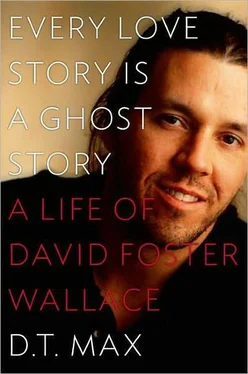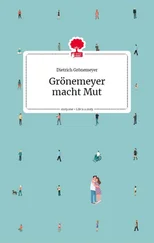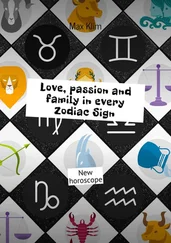He explained how hard the past few months had been on him: “I just seemed to lose my will to work as well as the ability to organize myself or my thoughts…. So far these haven’t come back and my confidence as a writer has left too…, confidence in being…a minimally functional human being. My ambitions at this point are modest and mostly surround staying alive.” He promised he would not try to kill himself again for the sake of his family, instead swore he would “try…to find a way to live and find a way of writing even if it’s not for publication. It’s what I really love to do. I’m figuring now, though, better an alive janitor than a dead whatever.”
The Nardil didn’t stabilize Wallace and his psychiatrists recommended electro-convulsive therapy. Wallace felt he had no choice but to try it. His sister came and sat with him the day before the treatment. She tried to distract him, but she could see how terrified he was. He had six courses of ECT, and afterward Wallace’s mother remembers that he emerged as delicate as a child. “He would ask, ‘How do you make small talk?’ ‘How can you know which frying pan to pick out of the cupboard?’”
His friends who came to visit him then were upset to see his short-term memory gone, but time passed and the depression eased and Wallace thought the treatments had been worth it. “They were unpleasant,” he wrote to his former sponsor in Arizona a month or so later, “but they helped quite a bit.” The Bad Thing had been beaten back. He also finally got some encouraging news about his writing. Gerry Howard had changed jobs, presented the same legal problems to the lawyers for his new employer, W. W. Norton, and gotten an answer opposite to the one Viking Penguin had given. At the end of November Wallace signed a letter consenting to the transfer of publishing rights to Norton, who then paid Viking Penguin the $25,000 it had advanced and became Wallace’s publisher. With a few changes, Norton felt they could publish Girl with Curious Hair . “Isn’t it a marvelous feeling to see the light at the end of the tunnel — and not just another tunnel?” Howard wrote Wallace in late December, with a list of proposed legal alterations. Among the few changes was that the words “moist loincloth” out of Alex Trebek’s mouth had to go. “Please find another ‘favorite word’ besides ‘loincloth,’ one without homoerotic associations,” Howard wrote. Wallace agreed to the changes—“loincloth” became “induce.”
“My favorite word,” says Alex Trebek, “is moist . It is my favorite word, especially when used in combination with my second-favorite word, which is induce .” He looks at the doctor. “I’m just associating. Is it OK if I just associate?”
At last the book would be published, small consolation for what was, Wallace wrote his sponsor, “far and away the worst year of my life.” He added: “I think I got the idea that if one got clean & sober and worked very hard” on the program, “life couldn’t help but get better. Well for me it’s not been true.”
Amazingly, the beginning of 1989 found Wallace at work. He had begun something, he wrote the editor of Conjunctions , Brad Morrow, in mid-January, “that’s shaping up to be very long and very strange.” And to Steven Moore, at the Review of Contemporary Fiction , he added the same day, “I have only very recently been able, emotionally and time-wise, to start on a new project.” He began sending out his work and collecting rejections just as he had at Arizona. He wrote to Brad Morrow in an upbeat mood three weeks later:
Personally I love sending stuff out — the careful Xeroxing, the cover letter that talks the thin line between unctious [ sic ] and arrogant, the SASE, the plumpness of the envelope…I’m the only Aspiring person I know who actually kind of likes (the first few) rejections, because that means I get to send it out again. I’d love to send you something out of the hopper, but as I said all I’ve got is a hundred or so pages of something that’s shaping up to be very long, possibly incoherent, and almost completely unexcerptable.”
What Wallace was working on is unclear — it may have been the pages that frustrated him at Amherst pulled out again or a reworking of the short story “Order and Flux in Northampton,” which he would shortly offer to Conjunctions . 18And his rediscovered élan seemed slightly forced — even to him. 19In his heart he was aware that something had to change. He could not go on this way forever. He was about to turn twenty-seven and he was still dependent on his parents for food and housing. His encounters with the mental health system had cost his insurance company a lot of money, and when the insurance ran out, his family had had to foot the bill, filling Wallace with guilt. To Morrow he wrote, “I figure if I ever want a mate and kids with straight teeth and command of the language I’m going to have to figure out a way to ensure income. The stuff I’m working on now is almost incoherent, and it would be at least two years before it was either done or any good or both.”
Remembering his early years at Amherst, he thought perhaps he might turn back to a professional career in philosophy. There was a literary precedent for such a decision — William Gass taught philosophy at Washington University — and he would have both structure and health insurance. Wallace applied to the graduate programs at the University of Pittsburgh, Princeton, and Harvard. One advantage of this last was that Mark Costello lived in nearby Boston, working as a legal associate. All three schools admitted Wallace and offered aid: he still had his remarkable college transcript, as well as stellar recommendations, a well-reviewed novel, and a second book on the way. What was troubling him was hidden. He chose Harvard. It had prestige, Costello, and three renowned philosophers, Hilary Putnam, John Rawls, and Stanley Cavell. To be admitted alone was an obvious honor, one his father would appreciate. He wrote a friend that he thought he could get a doctorate in two or so years. The average student took almost a decade.
By the time Wallace arrived in Boston in April 1989, Costello had already found them a two-bedroom apartment on the second floor of a clapboard house in Somerville, near the Cambridge line. The neighborhood was known as Little Lisbon, described by Wallace in a letter to Franzen as “95 % Portuguese and Brazilian aside from the young paleface refugees from the prices of H[arvard] Square and Back Bay.” On his way east Wallace’s car broke down in Ohio in front of a bar with a cigarette machine, which prompted him to take up smoking again (he had likely already started with pot and alcohol when he began to write again). He and Costello built cinderblock bookshelves and bought a futon and two thrift shop easy chairs. One smelled so bad that Wallace took it out to the curb and bought a new silver velour recliner instead. He took the front bedroom, Costello the back.
Costello would leave every morning in his suit and tie for his work as a lawyer, while Wallace stayed behind in the same Clearasil-stained bathrobe he’d worn since college, his shower towels spread out to dry. Wallace was writing, Costello saw, and filling notebooks — he came with a maroon spiral-bound one — though Costello did not know with what and Wallace did not tell him. Costello would come home and find his friend where he had left him, in his recliner, many hours and several showers later, a pen in his mouth and the notebook on his lap. “How was your day, honey?” Wallace would call out. For Wallace it was fun being back with his old roommate in the Northeast, and he was riding a high, not unlike the one after he had begun Nardil just before graduate school. Everything must have looked like it once had. “It’s lovely and crowded and ethnic and a far cry from flat black land straight to the world’s curve,” he wrote Steven Moore in mid-April.
Читать дальше












